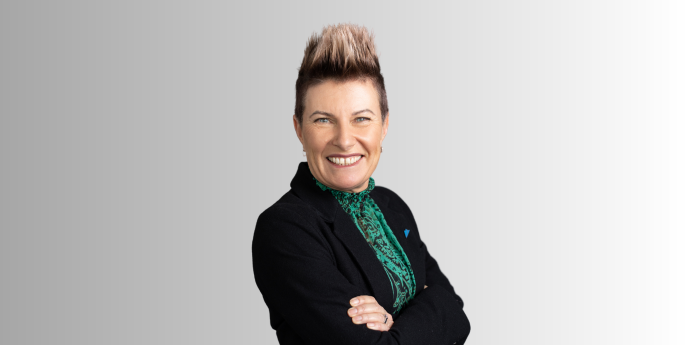Come on in, the water’s fine! The case of public sector governance
Public sector boards are not for the faint-hearted. Board members must navigate a complex, uncertain and demanding governance environment.
Full-time director Sheridan Broadbent says the Future Directors’ programme put the wind in her sails.

When asked what drives her, Auckland-based Sheridan Broadbent CMInstD says it was her father who ignited something in her very early on. It made a big impression and still remains with her. “My father would ask me every day, ‘How did you add value to your company today?’”
Broadbent started her career as an office junior, but says her dad’s question was firmly rooted at the forefront of her mind, and even then it was something she took very seriously.
“[It’s the] feeling of helping make the boat go faster, and supporting the creation of something that customers value and will endure,” she says.
These days, Broadbent is a full-time director who adds value for shareholders and stakeholders every day. She is on the Spark board (non-executive director), Manawa Energy (independent director), and an independent chair of Pipeline & Civil.
She was in an executive role when she took the plunge to explore governance and applied for the Future Directors’ programme. That was in 2017.
Broadbent was placed with Auckland International Airport as her host board. There she would find herself sitting alongside Richard Didsbury, Justine Smyth CFInstD, Joan Withers CFInstD and Sir Henry van der Heyden CFInstD, whose knowledge and experience Broadbent describes as “incredible”.
“Having exposure to the level of experience that folk like Richard Didsbury had in their background blew my mind,” she says, adding she felt fortunate to be paired with a board of “considerable depth and breadth who were very generous with their time”.
It was the first year for Auckland International Airport to participate in the Future Directors’ programme with Broadbent on a 12-month placement. She says although the framework and mentoring process was being created as they went along, the experience is something she wouldn’t trade.
“It was fantastic, hard work, interesting, instructive, fun and meaningful. [It was] terrific to learn about governance and the expectations that a board has of management.”
Broadbent saw immediate benefits of the programme, including benchmarking high performance across a number of fronts – cultural, technical and procedural, and it fed directly into her executive role.
“I was able to work with my, then, CEO to craft better board papers and support more insightful discussions at board level.”
“I see a few folk out there wanting to skip from middle management roles to governance because it looks fun and easy, and they think it is a well-paid gig. It is certainly not easy, not always fun, and not well paid for the hours you need to put in.”
Broadbent has been on a number of commercial, NGO and peak body boards since, and says each opportunity was supported by her experience as a Future Director.
She says those considering participating in the programme need to have first cut their teeth on significant leadership experience with some strong positive and negative experiences to draw on.
“I see a few folk out there wanting to skip from middle management roles to governance because it looks fun and easy, and they think it is a well-paid gig. It is certainly not easy, not always fun, and not well paid for the hours you need to put in.”
She reinforces that these positions should never be seen as “gigs” but taken seriously because of the huge responsibility and duty to shareholders who are entrusting the board with their money. They also need to be committed to always strive to do their best as part of a governance team.
“It is hard work with enormous fiduciary responsibility and requires an absolute commitment to investing in continuous learning about your sector, your regulatory environment, your competitors and your underlying markets or technology enablers.”
For boards considering participating in the programme, Broadbent says those that consider themselves a high-performing board would benefit enormously and should view it as a meaningful act of investment into good governance.
“You should do this for your country, your economy, your customers and your business,” she says.
She adds that a move in this direction is valuable if organisations have a high- performing CEO they want to develop, and getting them onto an external commercial board would benefit their development.
For Broadbent, the programme cemented a path in governance. She says the biggest takeaway was understanding that culture matters and this is influenced by the chair – the most important steward of high- performing board culture.
So what does that look like?
“A culture of interest, shared ambition and trust is really important, not just for the board to operate at a high level, but for the team comprising the executives and the board,” she says.
Broadbent refers to an article by governance strategy consultant and academic, Dr Denis Mowbray, who outlines the traits of a high performance ‘third team’ as synergy, trust and confidence.
“That is true in my experience, but sadly it is not always present,” Broadbent says.